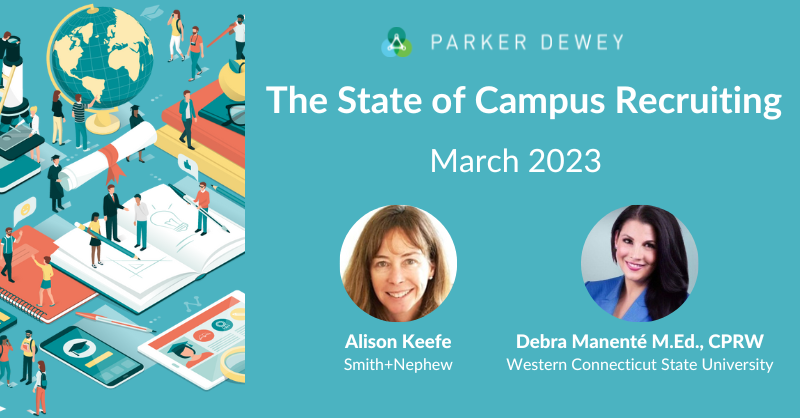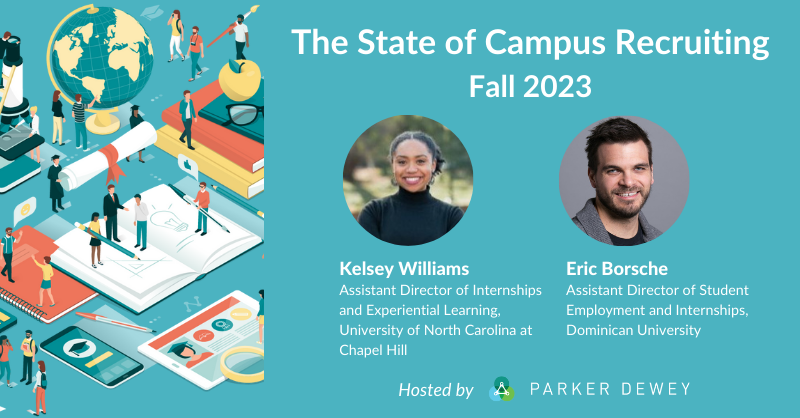-1.png)
Winter 2022: The State of Campus Recruiting
According to a recent Parker Dewey survey of current college students, 64% say they need more opportunities to build their skills in order to succeed in their internship and job search, while 50% reported that they don’t have enough experience on their resume to secure an opportunity. Students want skill-building experiences to include on their resume, and this happens to be the most effective way to recruit them. However, not all skill-building opportunities are created equal, with 38% of survey respondents saying that unpaid opportunities are unfair or hurt their opinion of the company.
Skills-based hiring is a method companies can employ to recruit well-rounded employees while increasing job accessibility. LinkedIn research shows that when companies leverage skills data to find the right match, they’re 60% more likely to find a successful hire than those not relying on skills. Skills are a greater predictor of success than traditional metrics, like GPA, academic pedigree, and social connections. Skills-based hiring can also increase the diversity of the workforce, allowing non-traditional job candidates opportunities to advance in their field of choice.
In our winter 2022 edition of The State of Campus Recruiting, panelists discussed ways in which companies and students can participate in skills-based hiring and offered insights on how the practice intersects with diversity.
Panelists included:
- Asha Aravindakshan, bestselling author of Skills: The Common Denominator
- Roy Moye III, Talent Acquisition Specialist at Spirit AeroSystems and Founder/CEO of STEMusic LLC
- Sean McGowan, Head of Employer Engagement at ThriveDX
Read on for some of the key takeaways from the conversation. In addition, watch a replay of the webinar here.
Breaking down skills-based hiring
Drawing from her book Skills: The Common Denominator, Asha explains that skills-based hiring involves making hiring decisions based on a candidate’s core skills, while relying less on traditional markers like academic pedigree, GPA, or bullets on a resume.
Asha: Skills-based hiring is when the employer actually changes the prerequisite criteria of a role. This could be removing the degree requirements, or the years of experience, allowing non-traditional applicants to feel encouraged to apply for the opening.
If you’re a nontraditional candidate who hasn’t had the opportunity for higher education, you should no longer be excluded from applying for roles where you learn those skills in other places, and you can bring them into a formal workplace.
How skills-based hiring creates more access to opportunities for underrepresented candidates
As the panelists noted, skills-based hiring helps remove barriers that might otherwise prevent candidates from applying to roles and specific companies. By emphasizing skills over other hiring signals, employers encourage applications from candidates who might otherwise be overlooked because of socioeconomic factors, education level, or underrepresented backgrounds. Beyond the hiring process, Roy also emphasized the importance of engaging ERGs or BRGs to support new hires for the duration of their time at a given company.
Roy: Removing that GPA requirement has been a really great add [for Spirit] if you’re a nontraditional student, or if you had a rough freshman year, or if you’re working multiple jobs—[those factors] can all impact that one number that’s supposed to define your whole life. It breaks down those barriers for nontraditional or first-generation students. Having those opportunities to be seen, or have a chance, means that you can have an at-bat.
Sean: We’re looking at a student that’s coming up and is being more choosy as a consumer, because at the end of the day, they have different options. I think it’s a great thing that there’s competition and options out there, because I think it makes the whole market really look at their deliverability method and say, “How can we ensure that we’re making our folks as employable as possible, as well as providing them the experience they want?”
There are some companies that have made some really great progress. We work with some companies who have looked at instead of degree requirement, total experience and education. Instead of saying you need a four-year degree, you need a two-year degree, maybe you need a bootcamp and a year of experience or two.
Top skills employers should consider in the hiring process
From communication, to professionalism, to leadership, core skills are valuable to employers, according to our panelists.
Sean: When we talk to employers, they’re not telling us the technical skills they’re looking for, they’re saying we’re looking for someone with drive, with problem solving, critical thinking, somebody who can be persistent and a learner, someone who’s curious. Those are all skills that can be developed in many different ways through different experiences.
Employers want to see the passion, because they want to know if they are going to invest in this person who maybe doesn’t have the education, they want to know that they have those skill sets and that passion to keep learning so that investment will pay off.
Asha: Let’s just start with entry-level roles. They all require, no matter where they are, the common skills of customer service, customer-first mentality, determination on the employee’s part, and basic writing skills. When you think about traditional recruiting methods, especially on-campus recruiting, it’s really limited to who can attend a career fair at a specific day or time.
Roy: In the context of where we are in society and in industry, we really want to also see those core competencies, things as simple as kindness, creativity, drive, passion…Yes, you could have that 4.0 student, or expert technical person who’s not able to work on a team or provide value with motivation and inspiration. Over a long period of time, that can do a lot of damage to your team.
How companies can begin to more towards skills-based hiring
Roy points out that companies can take small, meaningful steps towards adopting a skills-based hiring process. As he shares, experiential recruiting opportunities like Micro-Internships allow employers to trial skills-based hiring, without overhauling existing strategies.
Roy: At Spirit Aerosystems, we’ve seen some of these shifts and changes. We removed the 3.0 GPA requirement that we had in place, not only for interns, but also for full-time employees. That opens up the door to many other students and potential candidates.
Asha: If an employer can open up their recruiting options, to consider virtual or hybrid options, assessments, or revamping the evaluation criteria, that open mind will allow more candidates with transferable skills to apply and consider their work environments.
How employers can help students and recent graduates develop skills
Creating short-term opportunities for students to bring existing skills to the table and begin to develop new ones goes a long way, according to panelists.
Asha: I’m going to challenge the employers on the phone today: If you were to look back this year at the positions that went unfilled, and you were to break down those positions into projects that needed to be done for next year, you could get students to come in and complete those projects and evaluate them at the same time, and potentially fill those roles with those students when they graduate. I think it’s an incredible opportunity to take advantage of a situation that you may be dealing with in the workplace, and turn it into an opportunity to bring in more people with qualified skills to get the work done.
Sean: If you look at the nontraditional student that maybe is a single mom that has kids that’s working their current job while taking a class at night, that Micro-Internship can provide the flexibility to get some experience. Micro-Internships provide a lot of benefits for diverse folks in different situations.
Final advice for employers and students
Roy: Make sure you cultivate, provide that culture and that support, especially for your ethnically diverse employees, if that’s something you’re wanting to grow, be realistic about that and be intentional about that.
Sean: Learners need to focus on remembering to SMILE: strengths, motivation, interests, likability and energy.
Asha: Practice open-mindedness to bring the best talent into your organization.
Interested in learning more about how skills-based hiring can boost your DEI strategy? Schedule time with us today.
Stay tuned for more details on our next The State of Campus Recruiting call!



.png)
